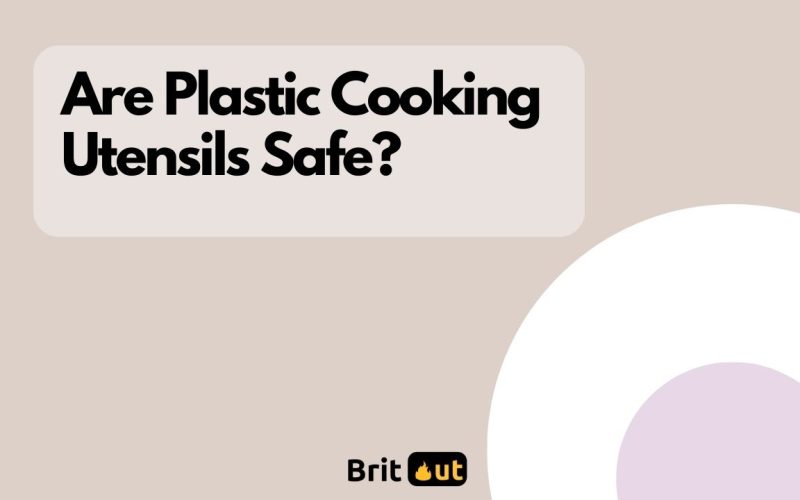Can the plastic cooking utensils you use every day be putting your health at risk? The safety of plastic kitchenware has been a hotly debated topic for years, with many experts weighing in on the risks of using plastic utensils in food preparation.
In this post, I will share with you some concerns about plastic utensils, their safety, and basically everything you need to know.
So, let’s get started
Are Plastic Cooking Utensils Safe?
Whether you are flipping your favorite pancakes with a plastic spatula or stirring a hot pot of soup with a plastic ladle, you’ve likely wondered about this. So let’s get into it!
To begin, it’s important to note that not all plastics are created equal. There are many different types of plastic, and some are safer for use in the kitchen than others.
For instance, plastic utensils made from food-grade plastic—those that meet certain safety standards—are generally safe to use.
These utensils are made from materials designed to withstand high temperatures, and they don’t typically leach harmful substances into food.
However, a word of caution: plastic utensils that aren’t rated for high heat can melt or warp when exposed to hot temperatures.
For this same reason, most plastics would melt when placed in the dishwasher.
Related: How To Tell if Plastic Is Dishwasher Safe
Generally, this not only damages the utensil but may also release potentially harmful chemicals into your food.
One such chemical is BPA (Bisphenol A), a substance linked to a variety of health concerns like cancer, hormonal disruptions, and heart problems.
It’s also worth mentioning that scratched or damaged plastic utensils can harbor bacteria, posing a food safety risk.
Therefore, it’s crucial to inspect your plastic utensils regularly and replace them if they show signs of wear and tear.
Lastly, it’s important when you’re shopping for plastic utensils, you look for those labeled as BPA-free and heat-resistant.
Always read the care instructions, and avoid using them in situations where they might be exposed to heat beyond their safe range, such as in a hot oven or on a barbecue grill.
The Pros And Cons Of Using Plastics for Cooking
There are both pros and cons to using plastic utensils that should be taken into consideration when making your decision.
On the pro side, plastic utensils are lightweight and easy to handle, making them ideal for tasks such as stirring, flipping, and serving.
They are also inexpensive, which means that you can easily replace them when they become worn or damaged.
Just like most advisable cooking utensils, they’re also non-reactive at the normal cooking temperature — this means that they won’t react with acidic or alkaline ingredients.
This also makes them a great choice for cooking dishes that contain ingredients such as tomato sauce or lemon juice.
However, there are also several cons as well…
For instance, one of the biggest concerns is the ability of plastic to leach chemicals into your food, as we explained earlier.
Also, because plastic is a porous material, it can be difficult to clean thoroughly. This can lead to the buildup of bacteria and other harmful microorganisms on the surface of your utensils, which can then transfer to your food during cooking.
In addition, they’re not as heat-resistant as other materials such as stainless steel or silicone.
This means that they can melt or deform when exposed to high heat, which can be dangerous to smell and can also affect the quality of your food.
Related: What to do if Accidentally Burned Plastic on a Stove
Better Alternatives to Plastic for Cooking
If you’re concerned about the risks associated with using plastic cooking utensils, there are several alternative materials that you can consider.
Here are some of the most popular options:
- Stainless Steel: Stainless steel is a durable and non-reactive material that is ideal for cooking utensils. It is easy to clean, heat-resistant, and won’t leach chemicals into your food. Additionally, stainless steel utensils have a sleek and modern look that can complement any kitchen décor.
- Silicone: Silicone is also a good material for cooking utensils. It is non-reactive, heat-resistant, and won’t scratch your non-stick cookware. Additionally, silicone utensils are flexible and can be easily bent and manipulated to fit the shape of your cooking vessel.
- Wood: Wooden utensils are a classic option that has been used for centuries. They are non-reactive, durable, and won’t scratch your cookware. Additionally, wood has natural anti-bacterial properties that can help to prevent the growth of harmful bacteria.
- Bamboo: Bamboo is a sustainable and eco-friendly alternative to plastic. It is durable, lightweight, and won’t scratch your cookware. Additionally, bamboo utensils have a natural beauty that can add a touch of elegance to your kitchen.
- Glass: Glass utensils are another non-reactive option that is easy to clean and won’t leach chemicals into your food. They are also heat-resistant and can be used for high-heat cooking methods such as baking and roasting.
When choosing alternative materials for your cooking utensils, it’s also important to consider your personal preferences and cooking needs.
Each material has its own unique set of pros and cons, so be sure to do your research and choose the material that best suits your needs.
Conclusion
The safety of plastic cooking utensils depends largely on their quality, their specific usage, and how well they’re cared for. By choosing BPA-free, heat-resistant plastics and replacing worn-out utensils regularly, you can reduce any possible health risks.






